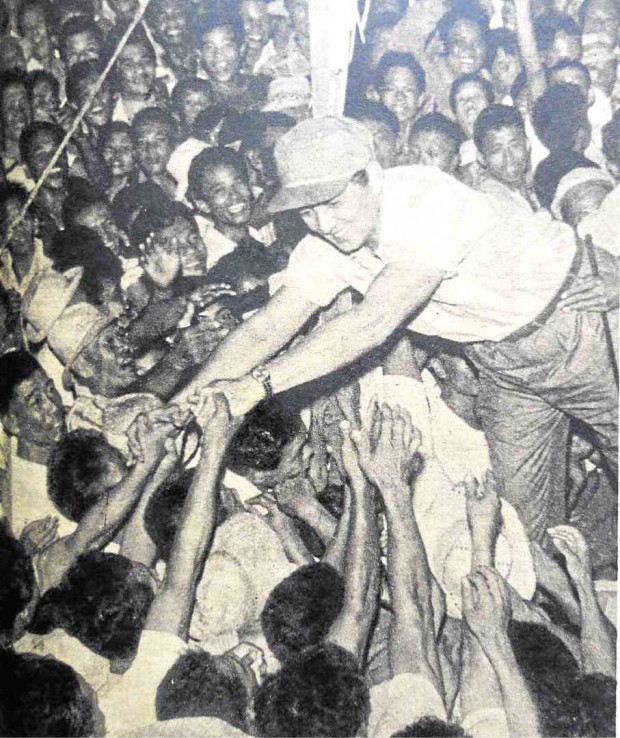
Snippets of Rogelio de la Rosa’s life as an actor and a politician. —HOLY ANGEL UNIVERSITY CENTER FOR KAPAMPANGAN STUDIES
LUBAO, PAMPANGA—Among his “kabalen” (provincemates), especially those in his hometown of Lubao, the centenary of Rogelio de la Rosa, the most popular matinee idol before and after World War II, was celebrated on Nov. 12 with lots of rightful pride and fond remembrances.
“He was a larger-than-life movie icon, a patriot and true gentleman,” said Robby Tantingco, director of Center for Kapampangan Studies (CKS) of Holy Angel University (HAU). “We want Filipinos not to forget that we once had movie stars and politicians like Rogelio de la Rosa.”
CKS and the local government of Lubao began the celebration with a Mass at San Agustin Church on Nov. 11. Soundtracks of “Maalala-ala Mo Kaya?” and De la Rosa’s other hit movies were played at the parish hall.
Up to next week, HAU is showing several movies of De la Rosa at CKS theater. Alongside is an exhibit on the man’s life and legacy.
Kapampangan poet laureate Francisco Guinto paid him homage through poems.
Asked why De la Rosa was being honored, Tantingco cited three reasons:
As an actor, De la Rosa crossed three mediums: zarzuela, vaudeville and films (his first starring role was in “Ligaw na Bulaklak” in 1929). In movies, he went beyond his good looks, honing the craft and rising as Asia’s Best Actor at the Hong Kong Film Festival for “Higit sa Lahat” in 1955. He was the first Filipino to star in an American motion picture, “The Avenger,” which was produced in Hollywood.
“On that score, Rogelio was not play acting. He was and is the Gentleman. No scandal marred his career. His private life was as private as one in the business could wish. Not many even in the industry knew that he was married during the height of his stardom and that his marriage was collapsing due to the pressures of filmmaking and even when he took a second wife, actress Lota Delgado, in marriage, there was not much fuss or bother.” He was the highest-paid actor in the 1940s to 1950s.
His being elected senator in 1957 paved the way for actors like Joseph Estrada and Fernando Poe Jr. in entering politics. As a legislator, he proposed bills for the nationalization of fisheries and agriculture and the creation of a censors’ board, among other things.
He proved that Kapampangans were united when he withdrew his candidacy for president to make his friend, brother-in-law and Liberal Party standard-bearer, Vice President Diosdado Macapagal, win against reelectionist President Carlos Garcia of the Nacionalista Party.
Wrote Quijano de Manila in the Philippines Free Press in November 1961: “Three days later, on Nov. 4, [Macapagal]
De la Rosa announced: “After deep soul-searching, I have come to the firm conclusion that the only way we can effect a change for the better in the life of our people is to unite against the present [Garcia] administration. I have thus decided to withdraw my candidacy for the presidency of the Philippines in favor of Vice President Macapagal.”
“Believe me, my friends, my decision was not easy to reach. It means a great personal sacrifice for me and my wife, and for thousands of our friends, sympathizers and supporters who have fought for what we believed to be a just and rightful cause: the cause of the common tao … But even the noblest idealism must give way to the unbreakable wall of realism. Divided, the opposition will fall; united, it will triumph,” he added.
To allegations of then Press Secretary Jose Nable that he received P500,000 and that he had been promised control of the Central Bank and the Bureau of Customs, De la Rosa countered:
“I will not stoop low to answer at this solemn moment the malicious and evil propaganda that are being spread about this decision I have taken. Suffice it to say that my conscience is absolutely and clearly satisfied that this is the best that could be done for our fatherland. Let our people and history be the ultimate judge.”
After leaving politics, Dela Rosa served as ambassador to Cambodia, The Netherlands, Poland, Bulgaria, Czechoslovakia and Sri Lanka.